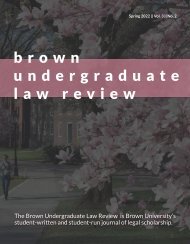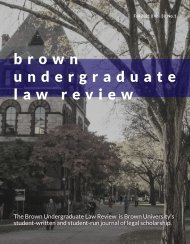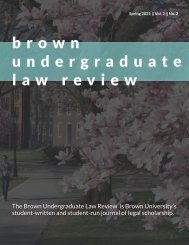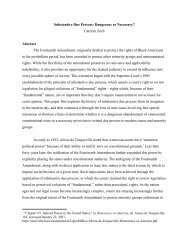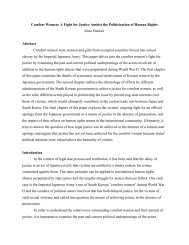Brown Undergraduate Law Review -- Vol. 2, No. 1 (Fall 2020)
We are proud to present the Brown Undergraduate Law Review's Fall 2020 issue. We hope you will all find our authors' works fascinating and thought-provoking.
We are proud to present the Brown Undergraduate Law Review's Fall 2020 issue. We hope you will all find our authors' works fascinating and thought-provoking.
You also want an ePaper? Increase the reach of your titles
YUMPU automatically turns print PDFs into web optimized ePapers that Google loves.
The Zenger Jury: A Mechanism of Legitimizing Popular Dissent
the most seditious libel possible. 25 In a monarchical
system, this precedent essentially negated the use of a truth
defense as all officials merely served as proxies of the king
and could claim an extension of lèse majesté protection.
Cosby?s prosecuting attorney conveyed this exact logic,
presenting Cosby as ?the King?s immediate representative
here.? 26 It is important to note that British authorities on
occasion permitted circulation of petitions alleging
factually based grievances. However, these same
authorities retained regulatory power over the language,
contents, and general approval of the documents, rendering
them effectively useless. 27 Thus, the limitations on truthful
criticisms imposed via a broad interpretation of lèse
majesté threatened the final bulwark of a royal
government?s accountability to its people.
Hamilton?s argumentation, adopted by the jury, redefined
libel law as a bright-line test surrounding the validity of
the defamation; a conviction for libel now relied on the
presence of falsehood. In effect, merely exposing Cosby?s
abuses did not constitute libel, as damage to the governor?s
reputation resulted from his own actions. Typical libel
defenses involved whether the accused actually said or
published the alleged statement, and whether the statement
was intended as an insult or criticism. 28 Zenger and
Hamilton rejected both paths to acquittal, relying
completely on the insults' validity. 29 This argument
contradicted all known legal precedent, rendering it an
unsupportable plea for the purpose of persuading a judge.
Thus, one may view this move as an appeal to the common
sense of the jury. Hamilton argued that the prosecuting
attorney?s designation of Zenger?s libel as ?false,
malicious, seditious, and scandalous? indicates that the
question of the statement?s truth exists in this case, despite
the recognized law: ?this Word false must have some
meaning, or else how came it here. . . . No, the Falsehood
makes the Scandal.? 30 This argument cleverly manipulates
the prosecution?s definition of libel, differentiating
between qualitative opinions about an individual and
statements of fact, insinuating that the latter do not seek to
demean but rather to illuminate the truth. This represents a
broader restructuring of justice as a means of pursuing
absolute truth, a shift embracing Enlightenment concepts
of rationality and empiricism. Propertied and educated
Americans, the same individuals eligible for jury service,
disproportionately espoused such ideology. Under this
adjusted framework, the jury could acquit Zenger if his
statements merely served to emphasize the realities of
Cosby?s behavior. Blackstone had long hailed juries as the
?best investigators of truth, and surest guardian of public
justice,? (emphasis added); assessing the validity of
Zenger?s accusations tested the jury?s ability to perform
this function. 31 Ironically, Cosby and his appointees?early
attempts to rig the trial inherently legitimized Zenger?s
criticisms that the ?law itself is at an end.? 32 The presiding
court consisted of two Cosby appointees and lacked a third
chair because Cosby could not find another complacent,
subservient judge; Judge Delancey, with Cosby?s hearty
approval, permanently disbarred Zenger?s two original
attorneys for suggesting a potential bias in the court. 33
25. Albert Smith Faught, ?Three Freedoms in the Eighteenth Century and the Effect of the Paper Shot,? University of Pennsylvania Law Review 94,
no. 3 (1946): 318.
26. Zenger, 10.
27. Elridge, 349?350.
28. Frederick Schauer, ?The Role of the People in First Amendment Theory,? California Law Review 74, no. 3 (May 1986): 762.
29. Zenger, 12.
30. Ibid, 15.
31. Blackstone, 214?215.
32. Ibid, 11.
33. Lewis, 30.
Brown Undergraduate Law Review
38




